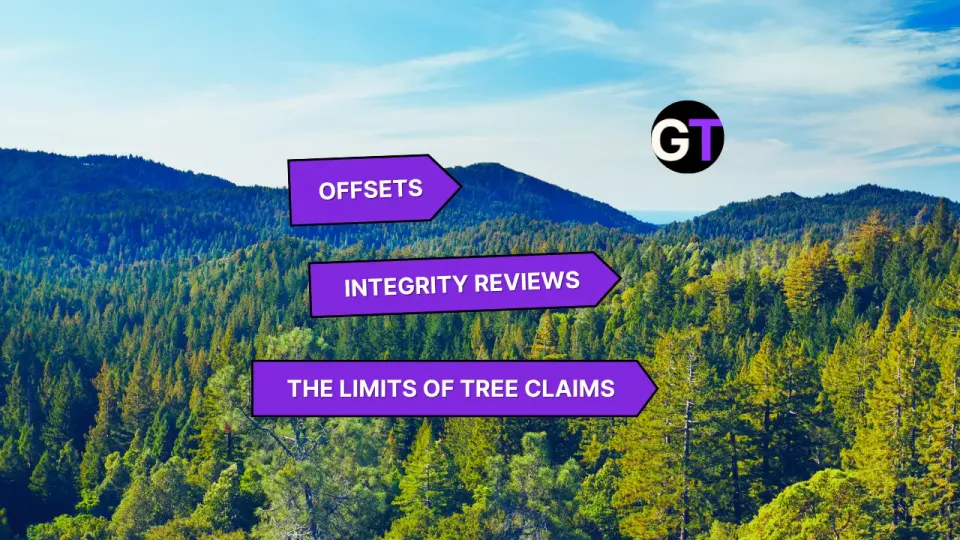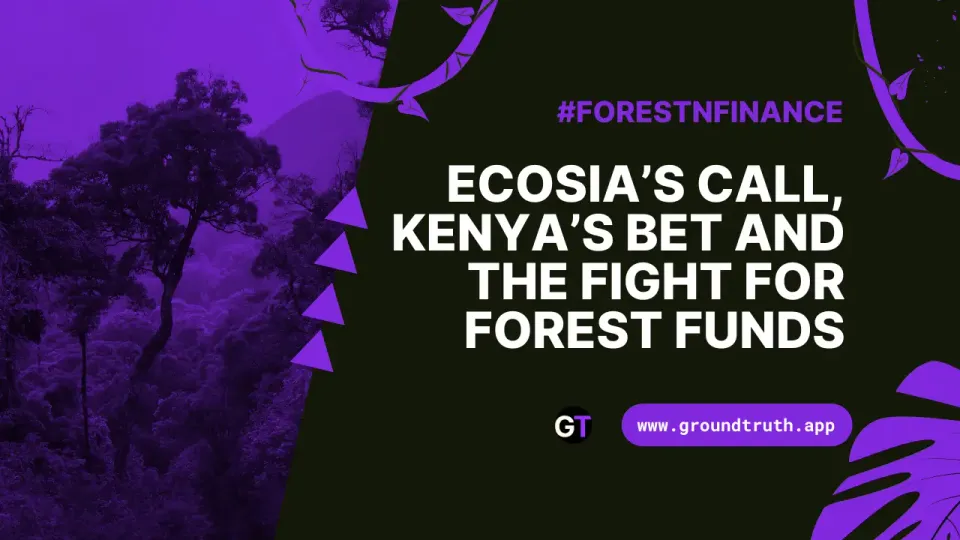Weekly News Roundup November 14 🗞️
EU deforestation law, corporate ESG monitoring, and more!

Philippines' National Greening Program: Trees that Tackle Climate and Economic Goals 🌳💼
The Philippines' National Greening Program (NGP) is transforming reforestation into a dual-purpose success, helping communities economically while reducing carbon emissions. This program not only increases forest cover but also boosts local economies, earning applause from the World Bank 🌍. Research even shows a “proximity perk,” with economic benefits spreading to nearby areas. It turns out, reforestation can support both climate and socioeconomic progress 🌲💰!
Do you think climate action and economic goals can truly go hand-in-hand, or is there always a trade-off?
👉👉Read more of our coverage on Ground Truth
Make-or-Break Moment for Europe’s Zero Deforestation Law 🌍🌳
This week, the European Parliament votes on the fate of the EUDR (Regulation on Deforestation-free Products), a critical law designed to curb Europe’s deforestation impact. Mighty Earth is urging Parliament to reject a proposed delay and new amendments that could severely weaken the EUDR, exempting traders from due diligence and introducing loopholes that might allow high-risk commodities to bypass regulation. With European citizens overwhelmingly in support of swift action to protect forests, the call for strong leadership from the European Commission and President Ursula von der Leyen is clear: stand firm on EUDR’s original timeline for 2025 and prioritize environmental action over industry loopholes 🌱.
Should European leaders push back against delays and enforce the EUDR as planned?
Cali Fund: Making Big Business Pay to Protect Nature 🌍💰
The new Cali Fund, launched at COP16 in Colombia, aims to make corporations that profit from nature's genetic resources give back 🌱. Targeting sectors like biotech, pharma, and cosmetics, the fund expects companies to contribute 1% of profits from genetic data—a concept known as digital sequence information (DSI). With a goal of raising $1 billion annually, half of the fund will support Indigenous communities directly, ensuring local voices in biodiversity protection get heard. While voluntary for now, this move signals a push to make corporate profits more accountable to environmental costs 🌿💼.
Can big business profit from nature while also paying to protect it, or are these goals at odds?
Brazil’s Amazon Sees 9-Year Low in Deforestation, but Fires Still Threaten Ecosystems 🇧🇷🔥
Good news! Deforestation in Brazil's Amazon dropped 30.6% over the past year, reaching its lowest point since 2015, with 6,288 square kilometers cleared by mid-2024. This is a win for conservation efforts, yet it’s shadowed by a massive surge in fires—up nearly 18-fold in September due to severe drought. Fires in the Amazon, Pantanal, and Cerrado regions highlight that while deforestation is down, wildfire damage still threatens these ecosystems. Brazil’s focus on conservation may be showing results, but climate risks like drought and fires make the path to sustainability complex 🌿.
Do you think efforts to reduce deforestation can overcome the challenges posed by wildfires and climate change?
Brazil’s $9 Billion Reforestation Plan: A Green Investment with Economic Potential 🌱💸
Speaking of Brazil, the country has renewed its ambitious $9 billion plan to restore 12 million hectares of forest by 2030, aiming to make reforestation an economic powerhouse. By combining replanting, natural regeneration, and ecosystem enhancements, this project could generate billions in revenue, create over 100,000 jobs, and reduce dependence on illegal logging 🌍. But to make this plan a reality, Brazil needs robust, reliable data—not just satellite views but on-the-ground details—to track and verify every step of the restoration. With strong data and coordination, Brazil could set a global standard for reforestation as a true economic opportunity 💪🌳.
Can large-scale reforestation succeed without ground-truth data, or is it essential for meaningful progress?
👉👉Read our coverage on Ground Truth
5 States Go Green with Major Environmental Wins at the Ballot Box 🌎🗳️
In a show of support for climate resilience, voters in five U.S. states approved billions in funding for environmental projects. Minnesota, California, Colorado, Rhode Island, and Louisiana all passed initiatives to boost conservation, wildfire prevention, water management, and coastal protection. From Minnesota’s funding for environmental education to California’s $10 billion for drought and wildfire response, these wins underscore a growing interest in concrete, local action to tackle climate challenges. Despite national political shifts, state-level voters are stepping up for the environment 🌱💸.
Do local environmental initiatives make a bigger impact than federal policy?
Verra’s Extended Deadline for Tree-Planting Carbon Credits 🌳⏳
Verra has pushed the deadline to June 30, 2025, for tree-planting carbon credit projects to meet its new, science-focused standards. This extension allows projects more time to align with Verra's updated methodology, VM0047, which prioritizes high-density planting and carbon capture potential. By setting a high bar, Verra aims to ensure each carbon credit represents genuine, lasting climate benefits, boosting transparency and impact 🌍💼.
Do you think these tougher standards will help carbon credits drive meaningful climate progress?
👉👉Read our coverage on Ground Truth
Forests Canada: Going National for Forest Restoration 🌲🇨🇦
Forests Ontario just leveled up to Forests Canada, taking its reforestation mission from local to nationwide! With Ontario as the launchpad, Forests Canada is rolling out projects coast to coast , tackling climate resilience, biodiversity, and economic support through tree planting 🌍. Key to their mission is the federal 2 Billion Trees program, aiming to plant 31 million trees across Ontario by 2031—and thousands more in Alberta, Nova Scotia, and beyond. By teaming up with Indigenous communities and conservation groups, Forests Canada is set to restore ecosystems and create green spaces that future generations will appreciate 🌱💪.
Do you think expanding regional programs like this nationally can make a big impact on climate resilience?
👉👉Read our coverage on Ground Truth
UAE’s Blue Forest Kicks Off Africa’s Largest Mangrove Project in Mozambique 🌊🌱
Blue Forest, a UAE-based mangrove restoration company, has launched an ambitious project to restore 5,000 hectares of mangroves along Mozambique’s Zambezia coastline, marking the first phase of Africa’s largest mangrove reforestation initiative. With a goal of planting 200 million mangrove trees by 2030, the MozBlue project is expected to remove 20.4 million tons of CO₂ over 60 years, while creating 1,250 jobs and strengthening local economies 🌍. Unique to this project, local communities are granted land rights over restoration areas, ensuring sustainable benefits long-term.
What kind of open data or transparency measures do you think are needed to track the project’s impact?
👉👉Read more in the Emirate Times
UNEP’s Emissions Gap Report 2024: "No More Hot Air … Please!" 🌍🔥
The Emissions Gap Report 2024 delivers a stark warning: without immediate and bold commitments, the 1.5°C climate goal will soon be out of reach. UNEP stresses that nations must strengthen their climate pledges, with cuts of 42% by 2030 and 57% by 2035. Without these actions, the world risks a temperature rise of 2.6–3.1°C by the century’s end, leading to devastating impacts on people and ecosystems alike. Promising solutions like solar, wind, and forest conservation are ready to make a difference, but they need urgent investment and global cooperation 🌞🌳.
Do you think countries will step up to meet these targets, or will the gap continue to grow?
👉👉Read more from the UNEP here
Edited by Chris Harris

This work is licensed under a
Creative Commons Attribution 4.0 International License.




